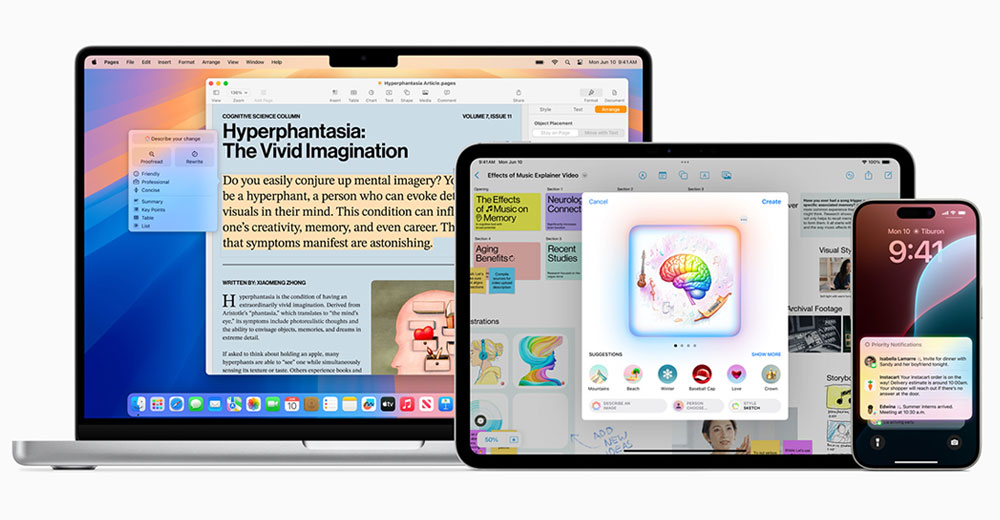Discover how Apple Intelligence’s personalized AI experience, on-device processing, and cross-platform integration set it apart from rivals like ChatGPT while prioritizing privacy.
Unveiled at WWDC 2024, Apple Intelligence brings robust personalization to AI across iPhone, iPad and Mac. On-device processing protects privacy, earning praise as a game-changer versus ChatGPT.
Apple Intelligence Announces Exciting New AI Features at WWDC24
Apple’s annual Worldwide Developers Conference (WWDC) kicked off with an exciting announcement – the launch of Apple Intelligence. This new set of AI-powered features aims to provide a personalized and private artificial intelligence experience across Apple devices.
Apple Intelligence focuses on customization, on-device processing, and tight integration across iOS, iPadOS, and macOS to set it apart from competitive offerings like Google’s Gemini and Microsoft’s Copilot.
Apple Intelligence Overview
During the WWDC24 keynote, Craig Federighi unveiled details of Apple Intelligence capabilities:
- Personalized AI – Tailors experience based on user data and usage patterns
- Language & image creation – Natural language processing for writing assistance and image generation
- On-device processing – Performs tasks on local device for privacy protection
- Ecosystem integration – Works across iPhone, iPad, and Mac for seamless experience
Federighi emphasized Apple‘s commitment to data privacy and security in enabling these features. Apple Intelligence analyzes requests to determine what can run locally on-device versus in a new private cloud compute environment when additional capacity is needed.
Independent experts can validate that this approach prevents Apple from accessing sensitive user information. The announcement sets up Apple Intelligence as a compelling alternative for those concerned about privacy pitfalls in consumer AI applications.
Key Apple Intelligence Capabilities
The tools encompassed in Apple Intelligence aim to add convenience and simplicity to everyday tasks by infusing AI throughout the Apple ecosystem.
Personalization
- Custom recommendations based on app usage and activity patterns
- Prioritized notifications so users see the most timely alerts
- Personalized search results that surface the most relevant content
By focusing on the individual, Apple Intelligence can automatically handle routine tasks and streamline workflows.
Writing Assistance
- Text proofreading with grammar and spelling corrections
- Text summarization for distilling key details
- Rewrite suggestions to improve clarity and flow
These features help users create professional written content, email communications, social media posts, and more.
Image Generation
- Create images based on text descriptions or existing photos
- Enhance/modify images by changing attributes or combining elements
Visual media can make content more engaging and memorable for audiences.
Cross-Device Capabilities
- Continuity enables seamless transition of tasks across iPhone, iPad and Mac
- Handoff lets users start activity on one device and pick up where they left off on another
The integration means Apple Intelligence delivers a unified experience regardless of which device(s) people use.
Apple Intelligence vs. Competitive Offerings
So how does Apple‘s new offering stack up against existing AI applications in the market? Here’s a look at some key differences.
Google Gemini
- Web-based search and assistance
- Lacks personalized touch
- Questionable privacy protection
Gemini is handy for broad information lookup but doesn’t adapt to individuals.
Microsoft Copilot
- Focused on coding/development
- Programming oriented
- Available across devices
Copilot aids software creators but doesn’t translate to everyday consumer usage.
OpenAI ChatGPT
- Impressive conversational ability
- Lacks personal memory/context
- Security and bias concerns
While capable, ChatGPT has faced scrutiny over data vulnerability and answer accuracy.
The common limitation across these solutions is a lack of customization to individual users. By keeping data on-device where possible and enabling tight integration with apps and services people already use, Apple Intelligence stands apart.
Apple Privacy Advantages
As AI capabilities advance, safeguarding personal information is paramount. Apple Intelligence bakes in privacy protections including:
- Restricting data access from Apple
- Keeping processing on-device where feasible
- Allowing review of cloud compute environment
Apple’s commitment to data security gives confidence in adopting these new AI features. Other key privacy differentiators include:
- Tight control of hardware, software & processors
- Secure environment for cloud processing
- Transparency around handling of requests
Users have assurance that enabling Apple Intelligence won’t come at the cost of exposing sensitive personal information.
Analyst Opinions on Apple Intelligence
Industry analysts had positive perspectives on Apple‘s strategic approach with this announcement:
“Apple is the only one who can do it because they control the hardware, software and semiconductors in their system.” – Tim Bajarin, Creative Strategies
“If Private Cloud Compute is true to its word, it’s a nice effort and one that differentiates Apple pretty well.” – Eric Abbruzzese, ABI Research
“It allows them to bring more of these AI models onto the device, which helps their privacy stance. This is AI on Apple’s terms.” – Ross Rubin, Reticle Research
The consensus is that Apple Intelligence hits the sweet spots of personalization and privacy while advancing AI capabilities across iPhone, iPad and Mac.
The Bottom Line
With WWDC24 kicking off Apple Intelligence, consumers have an appealing new alternative for enjoying the benefits of AI without compromising on privacy. By keeping data under user control and delivering seamless integration across devices, Apple sets its offering apart from Google, Microsoft and other competitors.
The array of convenient features encompassed in Apple Intelligence paves the way for users to get more done with the help of artificial intelligence tuned to their individual needs. If the capabilities live up to what Apple demonstrated, this could be a game-changing shift in consumer AI adoption.
Conclusion
Apple Intelligence marks a bold evolution in Apple’s artificial intelligence strategy. The breadth of personalization, language, writing and image generation features sets high expectations.
Clearly Apple has Consumer and professional creatives in its crosshairs with this robust toolset infused throughout the ecosystem. But the company’s adherence to on-device processing and data privacy should captivate mainstream consumers drawn to AI but wary of personal data vulnerabilities.
If Apple nails the experience as demonstrated, Apple Intelligence could become the envy of the industry in balancing AI ambitions with real-world privacy safeguards. This promising platform gives Apple further momentum in advancing its machines while putting individuals firmly in control.
Apple Intelligence has consumers and professionals excited. Tight integration with privacy focus creates high hopes. Share your perspectives or read more takes on Apple’s big AI move.






